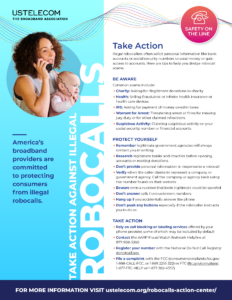October 8, 2021
Illegal robocallers often solicit personal information like bank accounts or social security numbers to steal money or gain access to accounts. Here are tips to help you dodge robocall scams.
BE AWARE OF COMMON SCAMS

- Charity: Asking for illegitimate donations to charity
- Health: Selling fraudulent or inferior health insurance or health care devices
- IRS: Asking for payment of money owed in taxes
- Warrant for Arrest: Threatening arrest or fines for missing jury duty or for other claimed infractions
- Suspicious Activity: Claiming suspicious activity on your social security number or financial accounts
PROTECT YOURSELF
- Remember legitimate government agencies will always contact you in writing
- Research legitimate banks and charities before opening accounts or making donations
- Don’t provide personal information in response to a robocall
- Verify when the caller claims to represent a company or government agency. Call the company or agency back using the number found on their website
- Beware even a number that looks legitimate could be spoofed
- Don’t answer calls from unknown numbers
- Hang up if you accidentally answer the phone
- Don’t push any buttons especially if the caller or robocaller instructs you to do so
TAKE ACTION
- Rely on call blocking or labeling services offered by your phone provider, some of which may be included by default
- Contact the AARP Fraud Watch Network Helpline at 877-908-3360
- Register your number with the National Do Not Call Registry
- File a complaint with the FCC at 1-888-CALL-FCC or 1 888 2255 322 or FTC at 1-877-FTC-HELP or 1-877-382-4357
Protect Yourself from Illegal Robocalls with our Infographics
- 5 Steps to Protect Senior Americans from Illegal Robocalls
- Do’s + Don’ts to Protect Yourself from Illegal Robocalls
- Protecting Yourself From Spoofing
America’s broadband providers are committed to protecting consumers from illegal robocalls.